本试题 “短文改错。I am good at all the subjects,and always ready help others.At school I get along wellwith my classmates.Therefore,I have a problem that...” 主要考查您对可数名词及其单复数
人称代词
形容词的比较级
连接副词
副词
介词和介词短语
从属连词
不定式
一般现在时
肯定句
等考点的理解。关于这些考点您可以点击下面的选项卡查看详细档案。
- 可数名词及其单复数
- 人称代词
- 形容词的比较级
- 连接副词
- 副词
- 介词和介词短语
- 从属连词
- 不定式
- 一般现在时
- 肯定句
可数名词:
是指能以数目来计算,可以分成个体的人或东西;因此它有复数形式,当它的复数形式在句子中作主语时,句子的谓语也应用复数形式。
可数名词复数的规则变化:
| 情况 | 构成方法 | 读音 | 例词 |
| 一般情况 | 加 –s | 1.清辅音后读/s/; 2.浊辅音和元音后读/z/; |
map-maps bag-bags car-cars |
| 以s,sh,ch,x等结尾的词 | 加 -es | 读 /iz/ | bus-buses watch-watches |
| 以ce,se,ze,(d)ge等结尾 的词 |
加 -s | 读 /iz/ | license-licenses |
| 以辅音字母+y结尾的词 | 变y 为i再加es | 读 /z/ | baby-babies |
1)以y 结尾的专有名词,或元音字母+y结尾的名词变复数时,直接加s变复数:
如:two Marys the Henrys monkey---monkeys holiday---holidays
比较:层楼:storey---storeys story---stories
2)以o 结尾的名词,变复数时:
a. 加s,如: photo---photos piano---pianos
b. 加es,如:potato--potatoes tomato--tomatoes
c. 均可,如:zero---zeros / zeroes
3)以f或fe 结尾的名词变复数时:
a. 加s,如: belief---beliefs roof---roofs safe---safes gulf---gulfs;
b. 去f, fe 加ves,如:half---halves knife---knives leaf---leaves wolf---wolves wife---wives life---lives thief---thieves;
c. 均可,如:handkerchief: handkerchiefs / handkerchieves
可数名词复数的不规则变化:
1)child---children foot---feet tooth---teeth mouse---mice man---men woman---women
注意:与 man 和 woman构成的合成词,其复数形式也是 -men 和-women。
如:an Englishman,two Englishmen. 但German不是合成词,故复数形式为Germans;Bowman是姓,其复数是the Bowmans。
2)单复同形 如:
deer,sheep,fish,Chinese,Japanese
li,jin,yuan,two li,three mu,four jin
但除人民币元、角、分外,美元、英镑、法郎等都有复数形式。如:
a dollar, two dollars; a meter, two meters
3)集体名词,以单数形式出现,但实为复数。
如:staff people police cattle 等本身就是复数,不能说a staff a people,a police,a cattle,
但可以说a person,a policeman,a head of cattle, the English,the British,the French,the Chinese,the
Japanese, the Swiss 等名词,表示国民总称时,作复数用。
如:The Chinese are industries and brave. 中国人民是勤劳勇敢的。
4)以s 结尾,仍为单数的名词,如:
a. maths,politics,physics等学科名词,为不可数名词,是单数。
b. news 是不可数名词。
c. the United States,the United Nations 应视为单数。
The United Nations was organized in 1945. 联合国是1945年组建起来的。
d. 以复数形式出现的书名,剧名,报纸,杂志名,也可视为单数。
"The Arabian Nights" is a very interesting story-book.
<<一千零一夜>>是一本非常有趣的故事书。
5) 表示由两部分构成的东西,如:glasses (眼镜) trousers, clothes ;
若表达具体数目,要借助数量词 pair(对,双); suit(套); a pair of glasses; two pairs of trousers
6)另外还有一些名词,其复数形式有时可表示特别意思,如:goods货物,waters水域,fishes(各种)鱼
复合名词的复数形式:
名词作定语名词作定语一般用单数,但也有以下例外。
1)用复数作定语。
如:sports meeting 运动会
students reading-room 学生阅览室
talks table 谈判桌
the foreign languages department 外语系
2)man, woman, gentleman等作定语时,其单复数以所修饰的名词的单复数而定。
如:men workers
women teachers
gentlemen officials
3)有些原有s结尾的名词,作定语时,s保留。
如:goods train (货车)
arms produce 武器生产
customs papers 海关文件
clothes brush衣刷
4)数词+名词作定语时,这个名词一般保留单数形式。
如:two-dozen eggs 两打/(二十四个鸡蛋)
a ten-mile walk 十里路
two-hundred trees 两百棵树
a five-year plan 一个五年计划
可数名词单复数知识体系:

不同国籍人的单复数:
国籍
总称(谓语用复数)
单数
复数
中国人
the Chinese
a Chinese
two Chinese
瑞士人
the Swiss
a Swiss
two Swiss
澳大利亚人
the Australians
an Australian
two Australians
俄国人
the Russians
a Russian
two Russians
意大利人
the Italians
an Italian
two Italians
希腊人
the Greek
a Greek
two Greeks
法国人
the French
a Frenchman
two Frenchmen
日本人
the Japanese
a Japanese
two Japanese
美国人
the Americans
an American
two Americans
印度人
the Indians
an Indian
two Indians
加拿大人
the Canadians
a Canadian
two Canadians
德国人
the Germans
a German
two Germans
英国人
the English
an Englishman
two Englishmen
瑞典人
the Swedish
a Swede
two Swedes
人称代词的概念:
人称代词是替代我、你、他、她、它、我们、你们、他们、她们、它们等人称的词。
人称代词分为主格和宾格形式,并有人称的单复数形式。按所替代人称的不同分为第一人称、第二人称和第三人称。
人称代词的用法:
人称代词在句中可以用作主语(用主格,如:I,you,he,she,we,they,等)和宾语(用宾格,如 me,you,him,her,us,them等)
如:He loves her, but she hates him. 他爱她,但她却讨厌他。
注:(1)在口语中,当人称代词用作表语、用于than, as之后或用于强调句中被强调时,可以用语。 例如:
"Who is it?" "It's me."“是谁呀?”“是我。”
He sings better than me. 他比我唱得好。
He is as tall as her. 他和她一样高。
It's me who did it. 这是我干的。但是,若than,as后的人称代词后跟有动词,则必须用主格。例如:
He sings better than I do./ He is as tall as she is.
(2)单独使用的人称代词通常用宾格。
"I' m tired.""Me too."“我累了。”“我也累了。”
"Who wants this?" "Me."“谁要这个?”“我要。”
(3)有时用主格或宾格会导致意思的变化。
I like you better than he. 我比他更喜欢你。为 I like you better than he likes you. 之略。
I like you better than him. 我喜欢你胜过喜欢他。为 I like you better than he likes him. 之略。
人称代词主格、宾格、人称、单复数对比:
|
人称代词 |
单数 |
复数 | ||
|
主格 |
宾格 |
主格 |
宾格 | |
|
第一人称 |
I |
me |
we |
us |
|
第二人称 |
you |
you |
you |
you |
|
第三人称 |
he |
him |
they |
them |
|
she |
her |
them | ||
|
it |
it | |||
人称代词的排序:
人称代词的排列顺序为:单数人称代词通常按“二三一”排列,即you, he and I;复数人称代词通常按“一二三”排列,即we, you and they:
You, he and I are of the same age. 你,他和我都是同一年龄。
We, you and they are all good citizens. 我们,你们和他们都是好公民。
但若是用于承担责任或错误等场合,则可把第一人称I置于其他人称代词之前:
I and Tom are to blame. 我和汤姆该受批评。
比较:Tom and I hope to go there. 汤姆和我想去那儿。
注意:you and I 是固定结构,语序通常不宜颠倒。
人称代词知识体系:
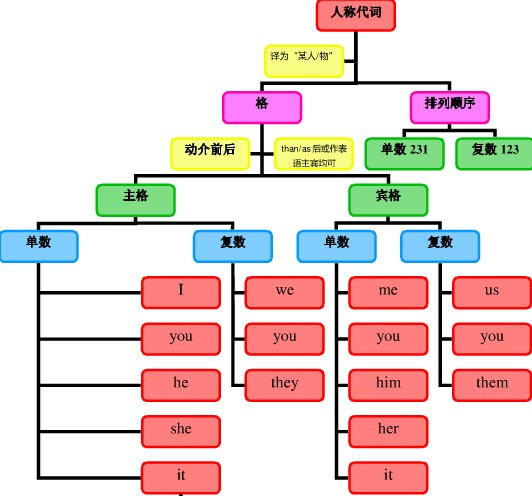
人称代词用法拓展:
1、在通常情况下,人称代词在句子中出现在它所代替的名词之后,即先出现名词,再出现相应的代词。但是,在书面语中,有时也可出现代词,后出现代词所代替的名词。
As soon as it had hopped off, the plane picked up speed.飞机刚一起飞,就加了速。
(比较:As soon as the plane had hopped off, it picked up speed.)
2、人称代词后跟名词同位语。有些人称代词后有时可跟同位语。
These small desks are forus students.这些小课桌是给我们学生的。
We girls often go to the movies together.我们女孩子常一起去看电影。
He asked you boys to be quiet.他要你们男孩子安静些。
形容词比较级概念:
大多数形容词(性质形容词)有比较级,用来表示两个人或事物之间的比较“较……”。
如:I am taller than you.
形容词比较级特殊用法:
1、没有比较对象的比较结构:
所谓没有比较对象的比较结构不是指省略而言,而是指并非真正的比较。
例如:The car runs faster than110 miles. 那辆车时速为110多英里。
There is more than one solution to the problem. 这个问题的解决办法不止一个。
The daily cost in an average hospital in the United States can run as high as $250. 在美国普通医院的每天的费用可高达250美元。
2、用比较级的形式表达最高级的意思:
在这种情况下,往往是将一个人或是一件事与其他所有的人或事相比较。注意别忘了常在比较状语中用any, other, else类的字眼,以将比较主体排除在比较对象以外,因为自己不可以与自己相比较。
例如:He is taller than any one else in our class. 他在我们班比其他任何都高。
Iron is more useful than any other metals. 铁比其他任何金属更有作用。
3、no+比较级+than的结构表示“A和B一样不……”:
例如:She runs no faster than her sister.她与她妹妹一样跑不快。
Tom is no wiser than John. 汤姆和约翰一样没有聪明才智。
He is no richer than his brother. 他与他弟弟一样不富有。
4、汉语可以说“昆明的气候比兰州好”。英语必须加that:
例如:The climate of Kunming is better than that of Lanzhou.
5、英语比较级常译作“较…”、“…一些”等,但不等于汉语的“更…”。汉语的“更…”须用“still”或“even”来表示:
如:This book is even more difficult than that one. 这本书比那本书更难。
6、有些情况下,汉语不用“较”等字眼,英语则须用比较级:
如:Will the younger people give their seats to old people? 请年轻人把座位让给老年人好不好?
形容词比较级的用法:
1、比较级用于二者的比较,其结构是:含有形容词比较级的主句+从属连词than引导的从句(从句中常省去意义上和主句相同的部分)。
如:Li is older than Zhou. 李比周年纪大。(从句中省去了is old)
There are more children in this nursey than in that one. 这个托儿所的孩子比那个托儿所多。(从句中省去了there are children)
After two years' physical training, she is healthier and stronger. 经过两年的体力锻炼,她(比以前)健康强壮多了。(注意这里省去了从句than she was)
We are much better off than ever before. 我们的生活比过去任何时候都要好得多。(than后省去了we were)
Paul weighs less than harry. 保尔的体重比哈利轻。
Mary is less clever than Jane. 玛丽不如简那么聪明。
2、可修饰比较级的词:
1)a bit, a little, rather, much, far, by far, many, a lot, lots, a great deal, any, still, even等
2)还可以用表示倍数的词或度量名词作修饰语。
3)以上词(除by far)外,必须置于比较级形容词或副词的前面。
典型例题:
1)—Are you feeling ____?
—Yes,I'm fine now.
A. any well
B. any better
C. quite good
D. quite better
答案:B. any可修饰比较级,quite修饰原级,well的比较级为better.
2)The experiment was____easier than we had expected.
A. more
B. muchmore
C. much
D. moremuch
答案:C. much可修饰比较级,因此B,C都说得通,但easier本身已是比较级,不需more,因此C为正确答案。
3)If there were no examinations, we should have___at school.
A. the happiest time
B. a more happier time
C. much happiest time
D. a much happier time
答案:D.
注:many, old和far用法:
1)如果后接名词时,much more+不可数名词 many more+可数名词复数
2)old有两种比较级和最高级形式:older/oldest和elder/eldest。elder,eldest只用于兄弟姐妹的长幼关系。
如:My elder brother is an engineer.
3)far有两种比较级,farther,further在英语中两者都可指距离。在美语中,father表示距离,further表示进一步。
如:I have nothing further to say.
3、比较级中的两个特殊作用的结构:
1)The+比较级+句子,表示的意义是“越(怎么样就)越(怎么样)”,在这个结构中的两个“比较级”不要求一定词性相同,它们各自的词性要依句子的需要而定;
2)和比较级+and+比较级。表示的意义是“越来越(怎么样)”,在这个结构中的两个“比较级”则要求词性相同。
例如:The harder you work at your study, the better academicrecords you will have. 你学习越努力,你的成绩就越好。
The more we have, the more we want. 人欲无穷。
When winter is coming, it gets colder and colder. 冬天来临之际,天越来越冷了。
He became less and less satisfied with the foot ball team's performance. 他对足球队的表现越来越不满意了。
形容词比较等级知识体系:
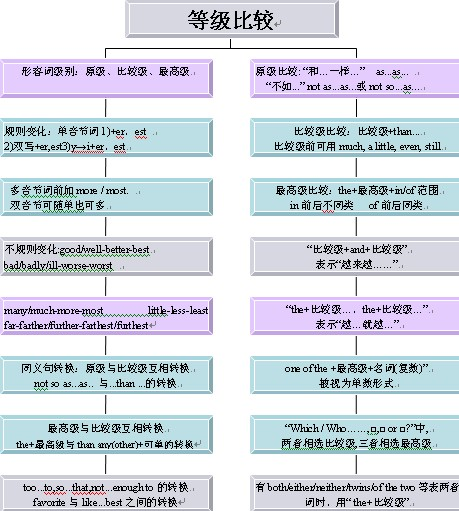
特殊形容词比较级变化:
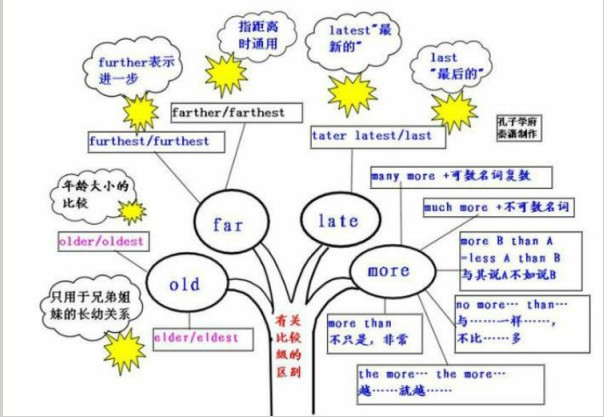
连接副词的概念:
连接副词可分为两类,一类是用于连接句子或从句,常见的有therefore, otherwise, however, moreover, still, thus, meanwhile等,另一类是用于引导从句或不定式,主要有when, why, where, how等。 例如:We all tried our best; however, we lost the game.
Tell me when we shall leave.
I do not know how to find him.
连接副词的分类:
连接副词可分为两类,一类是用于连接句子或从句,常见的有therefore, besides, otherwise, however, moreover, still, thus, meanwhile等;
另一类是用于引导从句或不定式,主要的有when, why, where, how等。
连接句子或从句的连接副词:
其性质类似于并列连词,使用时其前通常用分号或句号;若其前用逗号,则通常带有并列连词(如and):
如:I don't like it; besides, it's too expensive. 我不喜欢它,而且也太贵了。
We all tried our best; however, we lost the game./ We all tried our best. However, we lost the game. 我们都已尽了最大的努力,不过我们还是输了。
注意:有的连接副词(如however等)后通常有逗号与句子的其他成分隔开。另外,有的这类副词还可位于句中或句末:
如:Peter is our youngest child, and we have three others besides. 彼昨是我们最小的孩子,我们另外还有三个孩子。
He may, however, come later. 不过,他也许一会儿就到。
We all tried out best. We lost the game, however.我 们都已尽了最大的努力,不过我们还是输了。
引导从句和不定式的连接副词:
用于引导从句(名词性从句)或不定式的连接副词主要有when, why, where, how等:
如:Tell me when we shall leave./ Tell me when to leave. 告诉我什么时候离开。
I don't know how I can find him./ I don't know how to find him. 我不知道如何找到他。
Where we can get the money is just our problem./ Where to get the money is just our problem. 到哪里去弄这笔钱正是我们头痛的事。
That's why he speaks English so well. 那就是他为什么英语讲得这么好的原因。
注:连接副词why后不能接不定式,如可说:I don't know why I must leave. (我不知道我为什么必须离开),但不能说:I don't know why to leave.
副词的概念:
副词是指在句子中表示行为或状态特征的词,用来修饰动词、形容词、其他副词、介词短语、非谓语动词乃至整个句子,表示时间、地点、程度、方式等概念。
副词的位置:
1)在动词之前。
2)在be动词、助动词之后。
3)多个助动词时,副词一般放在第一个助动词后。
注意:
a. 大多数方式副词位于句尾,但宾语过长,副词可以提前,以使句子平衡。
如:We could see very clearly a strange light ahead of us.
b. 方式副词well,badly糟、坏,hard等只放在句尾。
如:He speaks English well.
副词的排列顺序:
1)时间,地点副词,小单位的在前,大单位在后。
2)方式副词,短的在前,长的在后,并用and或but等连词连接。
如:Please write slowly and carefully.
3)多个不同副词排列:程度+地点+方式+时间副词。
注意:副词very可以修饰形容词,但不能修饰动词。
改错:(错)I very like English.
(对)I like English very much.
注意:副词enough要放在形容词的后面,形容词enough放在名词前后都可。
如:I don't know him well enough.
There is enough food for everyone to eat.
There is food enough for everyone to eat.
兼有两种形式的副词:
1)close与closely:
close意思是“近”;closely意思是“仔细地”。
如: He is sitting close to me.
Watch him closely.
2)late与lately:
late意思是"晚";lately意思是“最近” 。
如:You have come too late.
What have you been doing lately?
3)deep与deeply:
deep意思是“深”,表示空间深度;deeply时常表示感情上的深度,“深深地” 。
如:He pushed the stick deep into the mud.
Even father was deeply moved by the film.
4)high与highly:
high表示空间高度;highly表示程度,相当于much。
如:The plane was flying high.
I think highly of your opinion.
5)wide与widely:
wide表示空间宽度;widely意思是“广泛地”,“在许多地方”。
如:He opened the door wide.
English is widely used in the world.
6)free与freely:
free的意思是“免费”;freely的意思是“无限制地”。
如:You can eat free in my restaurant whenever you like.
You may speak freely, say what you like.
副词知识体系:
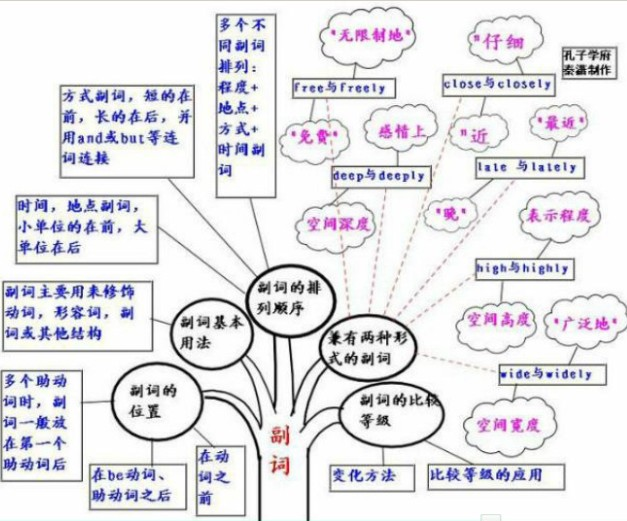
介词和介词短语的概念:
介词是一种用来表示词与词、词与句之间的关系的虚词,在句中不能单独作句子成分。介词后面一般有名词、代词或相当于名词的其他词类,短语或从句作它的宾语。介词和它的宾语构成介词词组,在句中作状语,表语,补语或介词宾语。介词可以分为时间介词、地点介词、方式介词和其他介词。
误用介词的三种情况:
1、多用介词:
多用介词可能是受汉语意思的影响将及物动词误用作不及物动词,也可能是受相关结构的影响而用错:
误:We discussed about the plan.
正:We discussed the plan. 我们讨论了计划。
误:Did he mention about the accident?
正:Did he mention the accident? 他提到那次事故了吗?
误:I saw her enter into the bank.
正:I saw her enter the bank. 我看见她进了银行。
误:He married with[to] a nurse.
正:He married a nurse. 他同一位护士结了婚。
误:How can contact with you?
正:How can contact you? 我怎么与你联系?
误:We should serve for the people heart and soul.
正:We should serve the people heart and soul. 我们应该全心全意地为人民服务。
误:Who controls over the factory? (但名词control可接over)
正:Who controls the factory? 谁管理这个工厂?
误:He has a great many of friends here. (比较a great number of)
正:He has a great many friends here. 他在这儿有很多朋友。
2、漏用介词:
漏用介词可能是受汉语意思的影响将不及物动词误用作及物动词,或是受相关结构的影响的影响而用错等:
误:This matter is difficult to deal. (deal with=处理)
正:This matter is difficult to deal with. 这事很难处理。
误:He is not a man to be depended.
正:He is not a man to be depended on. 他不是个可靠的人。
误:He took a cup of tea, and went on the story.
正:He took a cup of tea, and wentonwiththestory.他喝了一口茶,又接着讲故事。
误:My mother still regards me a child. (比较consider…as中的as可省略)
正:My mother still regards me as a child. 我母亲还把我当小孩看。
误:They insisted sending a car over to fetch us.
正:They insisted on sending a car over to fetch us.他们坚持要派车来接我们。
误:What he says is worth listening.
正:What he said is worth listening to.他的话值得一听。
3、错用介词:
错用介词的情况比较复杂,可能是因受汉语意思的而错,也可能是因弄不清搭配关系而错,可能是混淆用法而错,也可能是受相关结构的影响而错,可能是忽略语境而错,也可能是想当然的用错:
误:She called on his office yesterday. (call on+人,call at+地点)
正:She called at his office yesterday. 她昨天去了他办公室拜访。
误:He is engaged with a nurse.
正:He is engaged to a nurse.他与一位护士订了婚。
误:The sun rises from the east.
正:The sun rises in the east.太阳从东方升起。
误:Under his help, I finished it in time.
正:With his help, I finished it in time. 在他的帮助下,我及时做完了。
误:During he was in Japan, he visited many places.
正:During his stay in Japan, he visited many places.他在日本期间,参观过许多地方。
误:We are familiar to his character.
正:We are familiar with his character.我们了解他的性格。
误:Help yourself with the fruit.
正:Help yourself to the fruit.吃点水果吧。
介词的宾语:
1、名词或代词作介词宾语:
如:Are you interested in history? 你对历史感兴趣吗?
Don't worry about it. 别为它担心。
注:若是人称代词用作介词宾语,要注意用宾格。
如:No one can sing like her. 没有人能像她那样唱歌。(不能用like she)
2、动名词作介词宾语:
如:He is good at telling stories. 他善于讲故事。
In crossing the street he was run over. 他在穿过马路时被汽车撞倒。
3、过去分词作介词宾语:
如:We can't regard the matter as settled. 我们不能认为这事已经解决。
I take it for granted you have read the book. 我以为你读过这本书。
注:过去分词用作介词宾语通常只见于某些固定结构中,如上面第1句涉及regard…as(认为…是)结构,第2句涉及take sth for granted(认为某事属实)。在其他情况下,介词后通常不直接跟过去分词作宾语,若语义上需要接过去分词(表被动),可换用“being+过去分词”:
如:He went out without being seen by the others.他出去了,没有被其他人看见。
4、从句作介词宾语:
如:He was not satisfied with what she said. 他对她说的不满意。
I'm worried about where he is. 我担心他上哪儿去了。
注:介词后通常不接that从句,遇此情况需考虑用其他结构:
误:He paid no attention to that she was poor.
正:He paid no attention to the fact that she was poor. 他根本不注意她很穷这一事实。
但有个别介词(如except)可接that从句。
比较:I know nothing about him except that he lives next door./I know nothing about him except for the fact that he lives next door. 我只知道他住在隔壁,其它的就不知道了。
5、不定式作介词宾语:
如:I had no choice but to wait. 除了等,我没有别的选择。
He wanted nothing but to stay there. 他只想留在那儿。
They did nothing but complain. 他们老是一个劲地抱怨。
He never did anything but watch TV. 除了看电视,他从不干任何事。
注:(1)介词后接不定式的情形通常只见于but, except等极个别个词。该不定式有时带to,有时不带to,其区别是:若其前出现了动词do,其后的不定式通常不带to;
若其前没有出现动词do,则其后的不定式通常带to。
(2)介词后虽然通常不直接跟不定式作宾语,但却可接“连接代词(副词)+不定式”结构:
如:He gave me some advice on how to do it. 对于如何做这事他给我提了些建议。
6、形容词作介词宾语:
如:Her pronunciation is far from perfect. 她的语音远不是完美的。
In short, we must be prepared. 总而言之,我们要有准备。
Things have gone from bad to worse. 事情越来越糟。
注:(1)有些形容词用作介词宾语可视为其前省略了动名词being:
如:He regarded the situationas(being) serious. 他认为形势严重。
His work is far from(being) satisfactory. 他的工作丝毫不令人满意。
(2)有些“介词+形容词”的结构已构成固定搭配:in full全部地,全面地,无省略地; in private私下地,秘密地; in particular特别地;in general一般地,通常地,概括地; in brief 简言之;in short总之,简言之; in vain徒然地,徒劳无益地;for fee免费地,无偿地; for certain肯定地,确切地;for sure肯定地,确切地; for short为了简短,简称;atl arge自由自在地,逍遥法外; by far…得多
7、副词作介词宾语:
如:I can't stay for long. 我不能久呆。
It's too hot in here. 这里面太热了。
I looked every where except there. 除了那儿,我到处都看过了。
8、数词作介词宾语:
如:The city has a population of four million. 这座城市有四百万人口。
He was among the first to arrive. 他是第一批到的。
9、介词短语作介词宾语:
如:Choose a book from among these. 从这些书中选一本吧。
I saw her from across the street. 我从街的对面望见了她。
注:通常可后接介词短语作宾语的介词是from, till, until, since, except, instead of等。
比较:I took it from the bed. 我从床那儿(或床上)拿的。
I took it from under the bed. 我从床下拿的。
10、复合结构用作介词宾语:
如:She had no objection to Mary marrying him. 她不反对玛丽与他结婚。
She came in with a book in her hand. 她手里拿着一本书走了进来。
All the afternoon he worked with the door locked. 整个下午他都锁着门在房里工作。
介词短语的句法功能:
1、表语:
如:He was with a friend. 他和一个朋友在一起。
Health is above wealth. 健康胜过财富。
This knife is for cutting bread. 这把小刀是用于切面包的。
注:有些介词(如because of)引出的短语通常只用作状语,不用作表语:
误:His absence is because of the rain.
正:His absence is due to the rain. 他因雨未来。
但是,若主语是代词(不是名词),becauseof引出的短语可用作表语:
如:It is because of hard work. 那是因为辛苦工作的原因。
2、状语:
如:Don't touch it with your hands. 别用手去摸它。
Did you do this by design or by accident? 你这样做是有意的还是无意的?
3、定语:
如:This is his reply to your letter. 这是他给你的回信。
This is the best way of doing it. 这是做此事最好的方法。
My love for you is deeper than the sea. 我对你的爱比海深。
4、宾语补足语:
如:I found everythingin good condition. 我发现一切正常。
Her illness kept her in bed for a week. 她因生病在床上躺了一星期。
注:用作宾语补足语的介词短语在相应的被动语态中则为主语补足语:
如:He was regarded as a hero. 他被看成是英雄。
5、宾语:
如:A man stepped out from behind the wall. 一个人从墙后走出来。
He cannot spare anytime except on Sunday. 除星期日外,他抽不出时间。
6、主语:
如:Between6 and 7 suits me. 六点到七点对我比较适合。
After the exams is the time to relax. 考试后是轻松一下的时间。
注:介词短语通常不用作主语,尽管有时也像上面这样用作主语,但通常可视为是在一定的上下文中有所省略:
如:—When are we going to have the next meeting? 我们下次什么时候见面?
—On Tuesday may be convenient. 星期二可能比较方便。
此句中onTuesday虽用作主语,但可视为是其前省略了meeting一词:
即:Meeting during the vacation may be convenient.
从属连词的概念:
连词用于引导从句以形成句子的一部分或修饰句子的构成要素的叫作从属连词。
英语从属连词用法分类详解:
1、引导时间状语从句的从属连词:
(1)表示“当…时候”或“每当”的时间连词。主要的when, while, as, whenever:
如:He jumped up when the phone rang. 电话铃响时他吓了一跳。
We listened while the teacher read. 老师朗读时我们听着。
The phone rang just as I was leaving. 我正要离开,电话铃就响了起来。
(2)表示“在…之前(或之后)”的时间连词。主要的有before, after:
如:Turn the lights off before you leave. 离开前请关灯。
He started the job soon after he left the university. 他大学毕业后就开始做这份工作。
(3)表示“自从”或“直到”的时间连词。主要的有since, until, till:
如:He has lived here since he got married. 他结婚后就一直住在这儿。
Most men worked until[till] they're 65. 大多数男人工作到65岁。
(4)表示“一…就”的时间连词。主要的有as soon as, the moment, the minute, the second, the instant, immediately, directly, instantly, once, no sooner…than, hardly…when等:
如:Tell him the news as soon as you see him. 你一见到他就把这消息告诉他。
I recognized her the moment(that) I saw her. 我一看到她就认出她来了。
I want to see him the minute(that) he arrives. 他一到来我就要见他。
I went home directly I had finished work. 我一干完活就回家了。
Once he arrives, we can start. 他一来我们就可以开始。
(5)表示“上次”、“下次”、“每次”等的时间连词。主要的有every time(每次),each time(每次),(the) next time(下次),any time(随时),(the) last time(上次),the first time(第一次):
如:Last time I saw him, he looked ill. 上次我见到他的时候,他好像有病。
Next time you're in London come and visit us. 你下次来伦敦过来探望我们。
Do look me up next time you're in London. 你下次到伦敦来,一定来找我。
Every time I call on him, he is out. 我每次去访问他,他都不在。
You can call me any time you want to. 你随时都可以给我打电话。
【注】every time,each time,any time前不用冠词,(the)next time, (the)last time中的冠词可以省略,而the first time中的冠词通常不能省略。
2、引导条件状语从句的从属连词:
这类连词主要有if, unless, as[so] long as, incase等:
如:If anyone calls tell them I'm not at home. 要是有人打电话来,就说我不在家。
You will fail unless you work hard. 你若不努力就会失败。
As[So] long as you need me, I'll stay. 只要你需要我,我就留下。
In case I forget, please remind me about it. 万一我忘记,请提醒我一下。
【注】在条件状语从句中,通常要用一般现在时表示将来意义,而不能直接使用将来时态。不过,有时表示条件的if之后可能用will,但那不是将来时态,而是表示意愿或委婉的请求(will为情态动词):
如:If you will wait a moment, I'll fetch the money. 请等一下,我就去拿钱。
3、引导目的状语从句的从属连词:
主要有in order that, so that, in case, for fear等:
如:We used the computer in order that we might save time. 我们使用计算机是为了节约时间。
Speak clearly so that they may understand you. 说清楚,以便让他们能明白你的意思。
Be quiet in case you should wake the baby. 安静些,免得把婴儿吵醒。
He is working hard for fear he should fail. 他努力工作以免会失败。
4、引导结果状语从句的从属连词:
主要的有so that, so…that, such…that等:
如:We're all here now, so that the meeting can begin at last. 我们现在都到齐了,终于能开会了。
It's so difficult a question that none of us can answer it. 那是一个很难的问题,我们没有一个人能回答。
He shut the window with such force that the glass broke. 他关窗户用力很大,结果玻璃震破了。
【注】so that中的that在口语中通常可以省略。
5、引导原因状语从句的从属连词:
主要的有because, as, since, seeing(that), now(that), considering(that)等:
如:He couldn't got to school because he had a cold. 他因患感冒而未能去上学。
Since everybody is here, let's begin our discussion. 大家都到了,我们就开始吧。
Seeing that it is 8o'clock, we'll wait no longer. 由于时间已到8点,我们将不再等了。
Now that you are here, you'd better stay. 你既然来了,最好还是留下吧。
6、引导让步状语从句的从属连词:
主要有although, though, eventhough, even if, while, however, whatever, whoever, whenever, wherever等:
如:Although[Though] he is poor, he is well contented. 他虽穷却能知足常乐。
Though[Even though] it's hard work, I enjoy it. 尽管是苦活,但我乐意干。
Even if you don't like wine, try a glass of this. 即使你不喜欢喝酒,也尝尝这杯吧。
7、引导方式状语从句的从属连词:
主要有as, like, as if, as though, the way等:
如:Do it as[like] he does. 像他那样做。
He behaved as if nothing had happened. 他装作若无其事的样子。
They treat me as though I were a stranger. 他们待我如陌生人。
Nobody else loves you the way(=as) I do.没有人像我这样爱你。
8、引导地点状语从句的从属连词:
主要有where, wherever, everywhere等:
如:There were lots of parks where I lived. 我住的地方有许多公园。
Sit wherever you like. 你想坐在那儿就坐在那儿。
Everywhere they went, they were warmly welcomed. 他们每到一个地方都受到热烈欢迎。
9、引导比较状语从句的从属连词:
主要有than和as…as:
如:It's easier than I thought. 这比我想像的要容易。
They are as often wrong as they are right. 他们错对各半。
10、引导名词性从句的从属连词:
主要有that, if, whether:
如:It is clear enough what he meant. 他是什么意思很清楚。
Your greatest fault is that you are careless. 你最大的缺点是粗心大意。
Whether it will do us harm remains to be seen.是否对我们有害还要看一看。
She didn't say if he was still alive. 她没说他是否还活着。
从属连词知识体系:
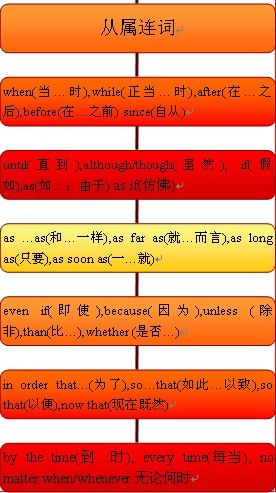
用作从属连词的六类名词结构:
英语中有些名词结构可用作从属连词,用以引导状语从句,且主要是时间状语从句。这类结构归纳起来有以下六类:
一、the+瞬间名词:
其中的瞬间名词主要包括moment, minute, instant, second等,其意为“一……就……”,相当于as soon as。
如:The minute he saw her he fell in love. 他对她一见倾心。
Telephone me the moment(that) you get the results. 你一有结果,马上给我打电话。
I was so tired that I fell asleep the instant I closed my eyes. 我很累,一合上眼就睡着了。
Sheputdownthereceiverthesecondsherecognizedmyvoice.她一听出是我的声音,马上就放下电话听筒。
注:其中的瞬间名词后可接that,也可省略。另外,有的个别副词(如directly/immediately等)也可表示类似意思。
如: Immediately the meal was over,he switchedon the radio.饭一吃完他就把收音机打开。
二、the+季节名词:
其中的季节名词包括spring,summer,autumn,winter,其意为“在……的那年春天、夏天、秋天、冬天。
如:His wife left him thes pring he went abroad.在他出国的那年春天,他的妻子离开了他。
He sold his house and went to the souththe summer he lost hisjob.在他失业的那年夏天,他卖掉房子去了南方。
He was sentto prison the winter his third daughter was born.在他第三个女儿出生的那年冬天,他被关进了监狱。
She got married the autumn she graduated from college.她大学毕业的那年秋天就结婚了。
三、the+时间名词:
其中的时间名词主要包括hour,day,night,week,month,season,year等,其意为“在……的时候、那天、那个晚上、那周、那个月、那个季节、那年”。
如: The hour he wa sin her office,he felt very sad.当他在她办公室的时候,他感到很伤心。
The day here turned home,his father was already dead.他回家的那一天,他的父亲已经死了。
The night I wenttoseeher,shehadleftforBeijingtoattendanimportantmeeting.就我去看她的那个晚上,她到北京去开一个重要的会议了。
Mr Smith didn't go to work the week his wife was ill.史密斯先生在他妻子生病的那个星期没去上班。
They ear helivedinthecountry,he learned alot.他在乡下呆的那一年,他学到了不少东西。
四、the+序数词+time
其中的序数词包括first,second,third,fourth等,其意为“当第几次……的时候”。
如: My girlfriend beat me at pokert he first time weplayed.我头一次和女朋友打扑克,她就把我赢了。
These cond time I saw her,she looked like an old woman.我第二次见到她时,她看上去像一个老太婆。
The third time I went there,I found all of them had left and the offices were all empty.我第三次去那儿时,我发现他们都离开了,所有的办公室都是空的。
注:
1.next,last也具有类似序数词的性质,因此也具有以上用法。
如: Nexttimeyoucomein,pleaseclosethedoor.下次你进来,请关门。
Thelasttimewetalkedhesaidheneededanothertwodays.上次我们谈话时他说他还需要两天。
2.thefirsttime,thesecondtime,thethirdtime等用作连词引导时间状语从句时,其前通常要有定冠词,而(the)nexttime,(the)lasttime引导状语从句时,其中的冠词可以省略,如下面这道上海高考题,其答案是C,不是A:
I though ther nice and honest______Imether.
A.first time B.fo rthe first time C.the first timeD.by the first time
五、不定代词+time
其中的不定代词主要包括each,every,any等。
如:Every time I ringher,the phone is engaged.我每次给她打电话,电话都占线。
Every time I see him he either wants to tell me his trouble or borrow some money.每次我见到他,他不是向我诉苦,就是要向我借钱。
He felt nervous each times he spoke to him.每次她和他讲话,他都感到紧张。
AnytimeyoucometoLondondolookmeup.你无论什么时候到伦敦来,一定要来看我。
注意:everytime,eachtime,anytime用作连词引导状语从句时其前习惯上不用冠词,它与the first time,these cond time,the third time等引导时间状语从句时其前必须要用定冠词不同。
六、其他名词结构
以上归纳的名词结构均用于引导时间状语从句,有些其他结构还可引导其他性质的状语从句,如the way可用于引导方式状语从句,表示“像……一样”。如:
The didn’t do it the way we do now.那时他们不像我们现在这样行事。
Joyce looked at me the way alotof girls did.乔伊丝像许多姑娘那样瞧着我。
注:这样用的theway与as用法相似。
如:Hold itin both hands,the way(=as)Mummy does.用两只手捧住,像妈妈那样。
动词不定式的概念:
动词不定式指由to加上动词原形(而且只能是动词原形)所构成的一种非限定性动词,但在有些情况下to可以省略。动词不定式在语法功能上可作主语、宾语、宾语补足语、
表语、定语和状语。
不定式的特殊句型对比:
1、不定式的特殊句型too…to…:
1)too…to 太…以至于…。
例如:He is too excited to speak. 他太激动了,说不出话来。
—Can I help you? 需要我帮忙吗?
—Well, I'm afraid the box is too heavy for you to carryi t, but thank you all the same. 不用了。这箱子太重,恐怕你搬不动。谢谢。
2)如在too前有否定词,则整个句子用否定词表达肯定,too后那个词表达一种委婉含义,意为“不太”。
例如:It's never too late to mend. 改过不嫌晚。(谚语)
3)当too前面有only, all, but时,意思是:非常…等于very。
例如:I'm only too pleased to be able to help you. 能帮助你我非常高兴。
He was but too eager to get home. 他非常想回家。
2、不定式的特殊句型so as to:
1)表示目的:它的否定式是so as not to do。
例如:Tom kept quiet about the accident so as not to lose his job. 汤姆对事故保持沉默是为了不丢掉他的工作。
Go in quietly so as not to wake the baby. 轻点进去,别惊醒了婴儿。
2)表示结果:
例如:Would you be so kind as to tell me the time? 劳驾,现在几点了。
3、不定式的特殊句型:Why not:
“Whynot+动词原形”表达向某人提出建议,翻译为:为什么不……? 干吗不……?
例如:Why not take a holiday?
不定式的用法:
1、不定式作补语:
1)有些有动词+宾语+不定式的结构。
例如:advise allow cause challenge command compel drive驱使
enable encourage forbid force impel induce instruct invite like/love order permit make let have want get warn persuade request send tell train urge 等。
例如:Father will not allow us to play on the street. 父亲不让我们在街上玩耍。
The officer ordered his men to fire. 长官命令士兵开火。
注意:有些动词如make,have,get,want等可用不定式作做宾补,也可用分词作宾补。现在分词表达主动,也表达正在进行,过去分词表达被动。
2)有些有动词+宾语+不定式的结构,不定式的动词往往是be,不定式一般可以省去。
例如:consider find believe think declare(声称) appoint guess fancy(设想) guess judge imagine know 等。
例如:We believe him to be guilty. 我们相信他是有罪的。
We know him to be a fool. 我们知道他是个笨蛋。(tobe不能省去)
典型例题:Charles Babbage is generally considered___the first computer.
A. to invent
B. inventing
C. to have invented
D. having invented
答案:C. 一般没有consider+宾语+be以外不定式的结构,也没有consider+宾语+doing的结构,排除A、B、D。consider用动词be以外的不定式作宾补时,一般要求用不定式的完成式,故选C。 3)有些动词可以跟there+to be的结构。例如:believe expect intend like love mean prefer want wish understand 等。
例如:We didn't expect there to be so many people there. 我们没料到会有那么多人在那里。
You wouldn't want there to be another war. 你不至于想让另外一场战争发生吧。
2、不定式作主语:
不定式作主语,往往用it作形式主语,真正的主语不定式放至句子的后面。
例如:It's so nice to hear your voice. 听到你的声音真高兴。
It's necessary for you to lock the car when you do not use it. 不用车的时候,锁车是有必要的。
It's very kind of you to help us. 他帮助我们,他真好。
It seemed selfish of him not to give them anything. 他不给他们任何东西,这显得太自私了。
3、不定式作表语:
不定式可放在be动词后面,形成表语。
例如:My work is to clean the room every day. 我的工作是每天清扫房间。
His dream is to be a doctor. 他的梦想是成为一名医生。
4、不定式作定语:
不定式做定语通常要放在被修饰的词后,往往表示未发生的动作。
例如:I have a lot of work to do.我有许多事要做。
There was nothing to bring home that morning. 那天早上(他回家时)两手空空。
5、不定式作状语:
1)目的状语:常用结构为to do,only to do(仅仅为了), in order to do,so as to do,so(such)...asto…(如此…以便…)。
例如:He ran so fast as to catch the first bus. 他飞快地跑以便赶上第一班车。
I come here only to say good-bye to you. 我来仅仅是向你告别。
2)作结果状语,可以表示没有预料到的或事与愿违的结果,不定式要放在句子后面。
例如:I awoke to find my truck gone. 我醒来发现箱子不见了。
He searched the room only to find nothing. 他搜索了房间,没发现什么。
3)表原因:
例如:I'm glad to see you. 见到你很高兴。
She wept to see the sight. 她一看到这情形就哭了。
4)表示理由和条件:
例如:He must be a fool to say so.
You will do well to speak more carefully.
You will do well to speak more carefully.
不定式知识体系:
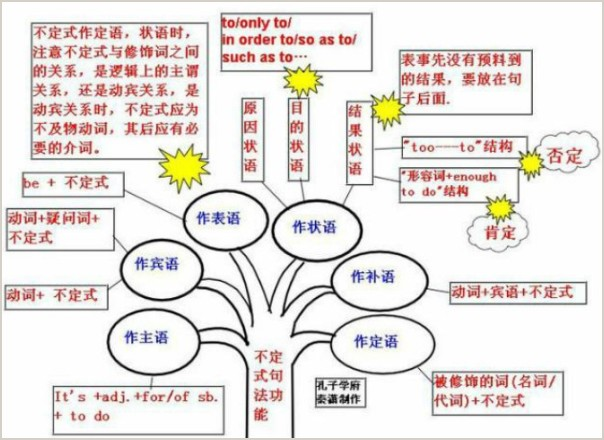
不定式用法拓展:
1、用作介词的to:
to可以用作介词,也可用作不定式的标示。下面的to都用作介词:admit to object to beaccus to med to beused to stick to turn to开始 look forward to be devoted to pay attention to contribute to apologize to devote oneself to
2、省去to的动词不定式:
1)情态动词(除ought外)后。
2)使役动词let,have,make后,感官动词see, watch, lookat, notice, observe, hear, listento, smell, feel, find等后。
注意:被动语态中不能省去to。
例如:I saw him dance. 我看见他跳舞。=He was seen to dance.
The boss made them work the whole night. 老板让他们整夜干活。 =They were made to work the whole night.
3)would rather,had better句型后:
4)Why…/why not…句型后:
5)help后可带to,也可不带to, help sb(to)do sth:
6)but和except后:
but前是实义动词do时,后面出现的不定式不带to。
比较:He wants to do nothing but go out. 他只想出去玩。
He wants to believe anything but to take the medicine. 除了吃这药,他什么都信。
7)由and, or和than连接的两个不定式,第二个to可以省去:
8)通常在discover, imagine, suppose, think等词后作宾补时,可以省去to be。
例如:He is supposed(to be)nice. 他应该是个好人。
3、动词不定式的否定式在不定式标志to前加上not。
例如:Tell him not to shut the window。让他别关窗。
She pretended not to see me when I passed by. 我走过的时候,她假装没看见。
4、It's for sb. 和It's of sb. 这样的句子中,由于表语形容词性质的不同,导致了不定式逻辑主语标志用for或of的区别。
1)for sb. 句型中的形容词一般为表示事物的特征特点,表示客观形式的形容词,如easy, hard, difficult, interesting, impossible等:
例如:It's very hard for him to study two languages. 对他来说学两门外语是很难的。
2)of sb句型中的形容词一般为表示性格,品德,心智能力,表示主观感情或态度的形容词,如good, kind, nice, clever, foolish, right。
例如:It's very nice of you to help me. 你来帮助我,你真是太好了。用for还是用of的另一种辨别方法:用介词for或of后面的逻辑主语作句子的主语,用介词前边的形容词作表语,造个句子。如果通顺用of,不通则用for。
例如:You are nice.(通顺,所以应用of)。
He is hard.(非所表达的意思,不通,因此用for。)
一般现在时的概念:
表示通常性、规律性、习惯性的状态或者动作(有时间规律发生的事件)的一种时间状态。
一般现在时的用法:
1)经常性或习惯性的动作,常与表示频度的时间状语连用。常用的时间状语有every...,sometimes,at...,on Sunday等。
例如:I leave home for school at 7 every morning. 每天早上我七点离开家。
2)客观真理,客观存在,科学事实。
例如:The earth moves around the sun. 地球绕太阳转动。
Shang hai lies in the east of China. 上海位于中国东部。
3)表示格言或警句。
例如:Pride goes before a fall. 骄者必败。
注意:此用法如果出现在宾语从句中,即使主句是过去时,从句谓语也要用一般现在时。
例如:Columbus proved that the earth is round. 哥伦布证实了地球是圆的。
4)现在时刻的状态、能力、性格、个性。
例如:I don't want so much. 我不要那么多。
Ann writes good English but does not speak well. 安英语写得不错,讲的可不行。
比较:Now I put the sugar in the cup. 把糖放入杯子。
I am doing my homework now. 我正在做功课。
第一句用一般现在时,用于操作演示或指导说明的示范性动作,表示言行的瞬间动作。
第二句中的now是进行时的标志,表示正在进行的动作的客观状况,所以后句用一般现在时。
一般现在时知识体系:

一般现在时用法拓展:
1、一般现在时表将来:
1)下列动词come, go, arrive, leave, start, begin, return的一般现在时可以表示将来,主要用来表示在时间上已确定或安排好的事情。
例如:The train leaves at six tomorrow morning. 火车明天上午六点开。
—When does the bus star? 汽车什么时候开
—It stars in ten minutes. ?十分钟后。
2)以here, there 等开始的倒装句,表示动作正在进行。
例如:Here comes the bus.=The bus is coming. 车来了。
There goes the bell.=The bell is ringing. 铃响了。
3)在时间或条件句中。
例如:When Bill comes(不是will come), ask him to wait for me. 比尔来后,让他等我。
I'll write to you as soon as I arrive there. 我到了那里,就写信给你。
4)在动词hope, take care that, make sure that 等的宾语从句中。
例如:I hope they have a nice time next week. 我希望他们下星期玩得开心。
Make sure that the windows are closed before you leave the room. 离开房间前,务必把窗户关了。
2、一般现在时代替一般将来时:
When, while, before, fter, till, once, as soon as, so long as, by the time, if, in case(that), unless, even if, whether, the moment, the minute, the day, the year, immediately等引导的时间状语从句,条件句中,用一般现在时代替将来时。
例如:He is going to visit her aunt the day he arrives in Beijing. 他一到北京,就去看他姨妈。
3、一般现在时代替一般过去时:
1)"书上说","报纸上说"等。
例如:The news paper says that it's going to be cold tomorrow. 报纸上说明天会很冷的。
2)叙述往事,使其生动。
例如:Napoleon's army now advances and the great battle begins. 拿破仑的军队正在向前挺进,大战开始了
4、一般现在时代替现在完成时:
1)有些动词用一般现在时代替完成时,如hear, tell, learn, write, understand, forget, know, find, say, remember等。
例如:I hear(=haveheard)he will go to London. 我听说了他将去伦敦。
I forget(=have forgotten)how old he is. 我忘了他多大了。
2)用句型"It is…since…"代替"It has been…since…"。
例如:It is(=has been)five years since we last met. 从我们上次见面以来,五年过去了。
5、一般现在时代替现在进行时:
在Here comes…/There goes…等句型里,用一般现在时代替现在进行时。
例如:There goes the bell.铃响了。
时态一致:
1、如果从句所叙述的为真理或相对不变的事实,则用现在时。
例如:At that time, people did not know that the earth moves. 那时,人们不知道地球是动的。
He told me last week that he is eighteen.上星期他告诉我他十八岁了。
2、宾语从句中的,助动词ought, need, must, dare的时态是不变的。
例如:He thought that I need not tell you the truth. 他认为我不必告诉你真相。
肯定句的概念:
句子中不含否定词的就称为肯定句。肯定句的基本结构为:主语+谓语,陈述句的肯定形式分两种,一种为正常语序,一种为倒装语序。
例如:I have heard a lot that way.
In front of the car was Mike.
用于肯定句的常见结构:
1、already:
在通常情况下,already(已经)主要用于肯定句,一般不用于否定句或疑问句。
如:误:He hasn' tarrived already.
正:He hasn't arrived yet. 他还没有到。
注:有时用于否定句或疑问句中,主要表示惊讶。
如:Is he back already? 他怎么就回来了。
Haven't you seen him already? 难道你还没见到好?
2、excellent:
excellent意为“极好的”,含有绝对无疑的意思,通常只用于肯定句,不用于否定句。
如:误:The film is not excellent.
正:The film is not very good. 这部电影不是很好。
注:excellent通常也不用于疑问句、条件句等。
3、hurry up:
hurry up主要用于肯定句(尤其是肯定的祈使句),一般不用于否定句。在否定句中,用hurry即可。
如:误:Don't hurry up; we have enough time.
正:Don't hurry; we have enough time. 别急,我们有的是时间。
4、plenty(of):
在通常情况下,plenty(of)用于肯定句中,而不用于否定句中。
如:误:Have you plenty of food for the holidays?
正:Have you enough food for the holidays? 你有足够的食物供假期里吃吗?
注:在否定句或疑问中用enough, much, many等代之。具体地说,疑问句中通常用enough代替,否定句中通常用much,many代替。
比较:There is plenty of time. 时间还很多。
There isn't much time. 时间不多了。
Is there enough time? 时间还够吗?
5、some:
在通常情况下,some用于肯定句中,在否定句或疑问句中要用any代之。
如:误:I haven't some question to ask.
正:I haven't any question to ask. 我没有问题要问。
注:some有时也用于否定句,那多半有某种特殊的原因。
比较:I don't like any of the books. 这些书中我一本也不喜欢。
I don't like some of the books. 这些书中有几本我不喜欢。
I don't like some one of the books. 这些书中某一本我不喜欢。
另外,some有时也可用于疑问句,如希望得到肯定回答的疑问句,或表示请求或建议等。
如:May I have some paper? 我可以拿些纸吗?
Why not give her some flowers? 为什么不给她送些花呢?
表示“也”的副词also, too, as well通常不用于否定句,而主要用于肯定句或疑问句。
如:误:I don't like the film too.
误:I don't also like the film as well.
误:I don't like the film as well.
正:I don't like the film either. 我也不喜欢这部电影。
注:also和too有时可用于肯定句后所接的否定句中,表示“没有也……”。
如: Heleftbutshedidn’talsoleave.他走了,但她没有也一起走。
He bought a computer, but she didn't too. 他买了台电脑,但她没有也买台电脑。
另外,在正式文体中,also, too有时可用于否定词之前。
如:I also don't like it. 我也不喜欢它。
I, too, have never met anyone like him.我也是,没见过和他一样的人。
与“短文改错。I am good at all the subjects,and always ready...”考查相似的试题有:
- You can never be ________ when crossing the street. A.very carefulB.too carefulC.carefully enoughD.enough careful
- —Our Chinese athletes achieved great success in Beijing Olympics.—Yes. In Asia, no one could perform ________, I thin...
- 短文改错下列短文中共有10处语言错误,请在有错误的地方增加、删除或修改某个单词。增加:在缺词处加出加一个漏字(^),并在...
- Mr. Smith doesn’t like all that empty talk between Susan and Joan, which he thinks will definitely get them ________....
- Father together with his good friends was________to go out for a camp________it began to rain.[ ]A. hardly; thanB. ar...
- In the age of Google, our minds are adapting so that we are experts at knowing where to findinformation we don't reca...
- ______ he has made up his mind, no one can make him change it.A.UnlessB.OnceC.UntilD.As
- We must get up early tomorrow,______ we’ll miss the first bus to the Great Wall.A.soB.orC.butD.however
- Be careful with such things. If you _____, you’ll drop them.A.don’tB.aren’tC.won’tD.do
- As is announced in the newspaper, the 20thWorld Cup __________ in 2014 in Brazil between June and July.A.is heldB.w...